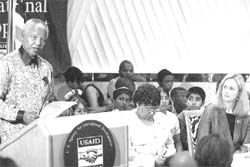Cry the beloved country
 the high cost of drugs to fight hiv/aids in developing countries was a recurring theme at the 13th International aids conference held in Durban, South Africa, in the second week of July. The official opening ceremony was preceded by a protest march of several thousand people organised by the Treatment Action Campaign. South African politician Mrs Winnie Madikizela-Mandela said that, instead of following the example of Uganda and taking serious action, South Africa wasted time with side-issues such as us scientists who claim that hiv does not cause aids.
the high cost of drugs to fight hiv/aids in developing countries was a recurring theme at the 13th International aids conference held in Durban, South Africa, in the second week of July. The official opening ceremony was preceded by a protest march of several thousand people organised by the Treatment Action Campaign. South African politician Mrs Winnie Madikizela-Mandela said that, instead of following the example of Uganda and taking serious action, South Africa wasted time with side-issues such as us scientists who claim that hiv does not cause aids.
Both on the day preceding the opening of the conference and on the opening day itself South African High Court Judge Edwin Cameron received standing ovations when he made a plea for cheaper drugs to be available in the developing world. As a person with hiv , he said, he could afford the rands 4000 a month that it cost to keep him alive but the same treatment was not available to millions of his countrymen.
Medecines Sans Frontieres, the Nobel prize-winning outfit, is confident the answer lies in mass-producing generic drugs. Anti-retroviral treatment could then be cut to us $200 from us $2,250 per year which is what the 85 per cent price cut offer by pharmaceutical companies would mean.
Ninety-five per cent of the world's 33.6 million hiv -infected people live in developing countries and sub-Saharan Africa accounts for nearly 70 per cent. At the conference's opening ceremony South African president Thabo Mbeki declared that a single virus could not be held responsible for the disease ravaging the continent. He said: "The world's biggest killer is extreme poverty."
Judge Cameron also made an impassioned plea for the anti-retroviral drug Nevirapene to be made available to pregnant mothers with hiv . The results of clinical trials conducted by South African scientists over a 10-month period showed that use of Nevirapene significantly decreased the chances of a baby becoming infected with hiv during birth, it was revealed at the conference.
This topic has become a very emotive one in South Africa, with the government health authorities claiming at first that Nevirapene was too expen-sive to administer to pregnant mothers. However, Government spokesperson at the conference said they would critically review the research data showing that Nevirapene was a cheaper alternative to azt in reducing mother-to-child hiv transmission and would look at its implications for public policy.
A presentation by Zambian scientist Chewe Luo revealed that the mother-to-child transmission rate in Africa stood at between 20-45 per cent, compared with only 6 per cent in industrialised countries offering anti-retroviral therapy. The rate in industrialised countries without the therapy was between 13 per cent and 33 per cent, she said. Luo said around 2.4 million hiv -infected women worldwide delivered babies each year, 600,000 of whom infected their babies. She claimed about 70 per cent of the transmissions were during delivery and 30 per cent in utero.
Scientists at the National Institute of Allergy and Infectious Disease in Washington have begun a series of clinical trials to make hiv / aids treatment more effective and less costly. The trials are designed to interrupt therapy using anti-retroviral drugs.
The factor of cost was an important one in administering drugs in developing countries, director of the institute, Anthony Fauci, said. The long-term effects of such "drug holidays" remained to be determined by clinical trials and results would not be known for at least a year. David Ho, ceo of the aids Research Centre of the University of New York, said that, even when a battery of drugs was used to treat hiv patients, scientists were not blocking the infection process completely. Although the area at risk was only 1 per cent of the whole, the virus was still able to replicate.
The executive director of the United Nation's Children's Fund ( unicef ), Carol Bellamy, said there was persuasive evidence that hiv / aids would be far less of a threat if governments invested adequate resources to care for pregnant women, protection of children from exploitation and in childhood health care and education. She said young people were the most vulnerable to hiv / aids - they were the world's first and last line of defence.
Reported by Patrick Leeman from Durban, South Africa
